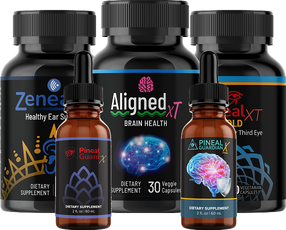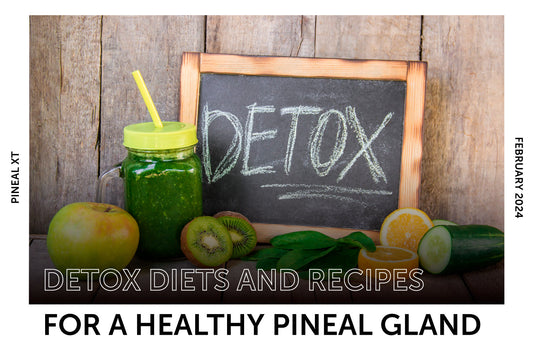How Turmeric Protects Your Pineal Gland From Fluoride Damage: What Research Reveals

Have you been struggling with unexplained sleep problems despite trying everything? Do you wake up feeling unrested, even after a full night's sleep? Or perhaps you've noticed increasing brain fog, memory lapses, or difficulty concentrating that you can't quite explain?
The culprit might not be stress, aging, or your busy lifestyle.
It could be something far more insidious: fluoride quietly accumulating in your pineal gland, the pea-sized organ deep in your brain that controls your sleep, hormones, and cognitive clarity.
Here's what most people don't realize:
Every time you brush your teeth, drink tap water, or consume processed foods, you're potentially exposing your brain to a neurotoxin that specifically targets your pineal gland.
This isn't speculation. It's peer-reviewed science published in leading medical journals.
But there's encouraging news emerging from research laboratories: a common kitchen spice may hold the key to protecting your brain from this daily threat.
The Hidden Threat Inside Your Brain
Your pineal gland (often called your "third eye" in ancient traditions) does far more than most people realize. This tiny endocrine gland serves as your body's master clock, coordinating crucial functions that affect every aspect of your health:
Your Sleep-Wake Cycle: The pineal gland produces melatonin, the hormone that tells your body when it's time to sleep and when to wake. When this function is impaired, you experience the frustrating cycle of lying awake at night, then struggling through exhausted days.
Cognitive Function: Beyond sleep, your pineal gland influences memory formation, mental clarity, and overall brain health. Melatonin acts as a powerful neuroprotective antioxidant, defending your brain cells from damage.
Hormonal Balance: The pineal gland helps regulate reproductive hormones, seasonal responses, and your body's overall endocrine system. When it's dysfunctional, you may experience mood swings, hormonal imbalances, and accelerated aging.
But here's the problem:
Research published in Caries Research reveals that by old age, your pineal gland accumulates fluoride at concentrations up to 5 times higher than any other soft tissue in your body, even higher than your bones.
Unlike most of your brain, which is protected by the blood-brain barrier, your pineal gland sits outside this protective shield.
It's completely exposed to whatever is circulating in your bloodstream, including fluoride from your toothpaste, tap water, and countless other sources you encounter daily.
When fluoride accumulates, it doesn't just sit there harmlessly. It combines with calcium to form hard deposits, essentially turning your once-supple pineal tissue into something resembling stone. This calcification progressively shuts down the gland's ability to produce melatonin and perform its vital functions.
The result? The sleep problems, brain fog, and cognitive decline that millions dismiss as "just getting older" may actually be preventable, and even reversible.
The Golden Solution: What Science Says About Turmeric

What if you could protect your pineal gland from fluoride damage using something as simple as a kitchen spice?
Multiple peer-reviewed studies published in leading scientific journals demonstrate that curcumin, the active compound in turmeric, offers remarkable protection against fluoride-induced brain damage.
A groundbreaking 2014 study in Pharmacognosy Magazine tested this directly.
Researchers exposed mice to fluoride levels comparable to what humans encounter through fluoridated water. One group received only fluoride. Another received curcumin alongside the fluoride exposure.
The results were striking: The fluoride-only group showed severe oxidative brain damage and significant neurodegeneration in the hippocampus, the brain's memory center. But the group receiving curcumin showed dramatically reduced damage, with near-normal brain tissue and significantly lower markers of oxidative stress.
Even more encouraging: A 2020 study in Basic and Clinical Neuroscience demonstrated that curcumin didn't just prevent new damage. It actually helped reverse cognitive and behavioral deficits in animals that had already suffered fluoride-induced brain damage during critical developmental periods.
How does this golden spice accomplish such powerful neuroprotection? Curcumin works through multiple interconnected mechanisms:
Antioxidant Defense: Curcumin directly neutralizes the free radicals generated when fluoride damages brain cells, while also boosting your body's own antioxidant enzyme systems.
Anti-Inflammatory Action: Fluoride triggers inflammatory cascades that accelerate pineal calcification. Curcumin interrupts these pathways, protecting tissue integrity.
Cellular Protection: Research shows curcumin helps maintain the structure and function of pinealocytes, the specialized cells that produce melatonin, even under fluoride assault.
Detoxification Support: Curcumin enhances your body's natural detoxification systems, potentially helping remove accumulated toxins more efficiently.
This isn't folk medicine or wishful thinking. These are reproducible results from controlled scientific studies, published in respected peer-reviewed journals, demonstrating real protective effects in living organisms.
Your Most Important Questions About Turmeric and Pineal Protection Answered
Now that you understand why turmeric matters for pineal health, you probably have practical questions.
Here are the answers you need:
How much turmeric do I actually need to protect my pineal gland?
The studies showing neuroprotective effects against fluoride used 500-1,000 mg daily of standardized curcumin extract or 1-3 grams of whole turmeric powder.
But here's the catch: Regular turmeric powder contains only about 3% curcumin by weight.
That means you'd need to consume roughly 1-3 tablespoons of turmeric daily to match research doses, more than most people can realistically incorporate through food alone.
This is why concentrated curcumin supplements are typically more practical for therapeutic pineal support. Look for products standardized to 95% curcuminoids to ensure consistent potency.
Critical for absorption: Curcumin is notoriously poorly absorbed when taken alone. To maximize benefits:
- Choose supplements that include black pepper extract (piperine), which increases absorption by up to 2,000%
- Take with healthy fats (olive oil, avocado, nuts) since curcumin is fat-soluble
- Consider specialized delivery systems like liposomal or nanoparticle formulations
Bottom line: For pineal protection matching research studies, a quality curcumin supplement (500-1,000 mg daily) combined with dietary turmeric is your best strategy.
Can I get enough protection from turmeric just by cooking with it?
Cooking with turmeric provides real health benefits and is definitely worth doing but it likely won't provide the concentrated doses shown to protect against fluoride damage in research studies.

Here's the reality:
- A typical curry might contain 1/2 to 1 teaspoon of turmeric (roughly 1.5-3 grams)
- At 3% curcumin content, that's only 45-90 mg of curcumin
- Research studies used 250-1,000 mg of curcumin daily
The smart approach: Use turmeric generously in cooking for baseline support and antioxidant benefits, AND take a concentrated supplement for therapeutic pineal protection.
Ways to increase dietary turmeric:
- Add to smoothies (blend with banana, mango, ginger, black pepper)
- Make golden milk (turmeric + plant milk + black pepper + honey)
- Season roasted vegetables, rice dishes, and soups
- Add to scrambled eggs or omelets
- Mix into salad dressings with olive oil and lemon
Think of dietary turmeric as your daily maintenance dose, and supplements as your targeted protection strategy.
Is turmeric actually safe to take every day long-term?
Yes, turmeric is generally considered safe for long-term daily use, with thousands of years of traditional use and modern research confirming its safety for long-term consumption.
What the research shows:
- Traditional populations in India consume 2-2.5 grams of turmeric daily throughout their entire lives with no adverse effects
- Long-term studies show no toxicity or serious adverse events with regular use
However, be aware of these considerations:
May enhance effects of blood-thinning medications:
- Warfarin, aspirin, clopidogrel (Plavix)
- Turmeric has mild blood-thinning properties that could amplify these medications
- Not necessarily dangerous, but your doctor may need to adjust medication doses
- Stop turmeric 1-2 weeks before scheduled surgery
Could interact with diabetes medications:
- Turmeric may lower blood sugar
- Could enhance effects of metformin or insulin
- Monitor blood sugar more closely when starting supplementation
May affect some chemotherapy drugs:
- Limited evidence suggests curcumin could interfere with certain cancer treatments
- Discuss with your oncologist before supplementing during active cancer treatment
Pregnancy considerations:
- Culinary amounts are completely safe
- High-dose supplements should be avoided during pregnancy (no human safety data)
- May stimulate uterine contractions in very high doses
Gallbladder concerns:
- Turmeric stimulates bile production
- May worsen symptoms if you have gallstones or bile duct obstruction
- Consult your doctor if you have gallbladder issues
Common mild side effects (rare):
- Digestive upset when first starting (take with food to minimize)
- Mild headaches (usually temporary, resolves within days)
- Yellow tint to skin or stool (harmless, due to curcumin's color)
The bottom line: Turmeric is one of the safest natural supplements available, but transparency with your healthcare provider about all supplements you take is essential, especially if you're on medications or have existing health conditions.
What's the difference between regular turmeric supplements and something like Pineal XT Gold?
This is where understanding targeted formulation matters.
Regular turmeric supplements:
- Contain only turmeric/curcumin
- Provide antioxidant and anti-inflammatory benefits
- Offer general neuroprotection
- May include black pepper for absorption
Comprehensive pineal support formulas like Pineal XT Gold:
- Combine turmeric with complementary ingredients specifically chosen for pineal health
- Address multiple aspects of pineal dysfunction simultaneously
- Include compounds that work synergistically
Why comprehensive formulas may be more effective:
While turmeric excels at protecting against fluoride-induced oxidative damage, pineal health requires a multi-faceted approach:
Fluoride removal: Iodine actively helps displace and remove fluoride from tissues. Turmeric alone doesn't remove fluoride. It protects against damage while fluoride is present. Combining turmeric (protection) with iodine (removal) addresses both sides of the problem.
Heavy metal detoxification: Chlorella binds to mercury, lead, and other heavy metals that also accumulate in the pineal gland. Turmeric doesn't chelate metals, so combining it with chlorella provides more comprehensive detoxification.
Calcification prevention: While turmeric reduces fluoride damage, other compounds like boron help prevent calcium-fluoride crystal formation. A complete formula addresses multiple calcification pathways.
Melatonin production support: Some ingredients specifically support the pineal gland's ability to synthesize melatonin, complementing turmeric's protective effects.
Think of it this way:
- Turmeric alone = putting up a shield against ongoing fluoride damage
- Comprehensive formula = shield + actively removing the threat + repairing the damage + optimizing function
For example, Pineal XT Gold combines:
- Turmeric (fluoride damage protection)
- Iodine (fluoride removal)
- Chlorella (heavy metal detox)
- Burdock (blood purification)
- Chaga (melanin support for pineal health)
- Amla (additional antioxidant support)
- Schisandra (liver support for enhanced detoxification)

Who benefits most from comprehensive formulas:
- People with significant pineal calcification
- Those with high fluoride exposure (fluoridated water, dental treatments)
- Anyone experiencing severe sleep disruption or cognitive issues
- People seeking maximum pineal restoration
Who can do well with turmeric alone:
- Those just starting pineal health optimization
- People with mild symptoms
- Those already filtering water and using fluoride-free products
- Anyone on a budget who wants to start somewhere effective
The honest answer: Even basic turmeric supplementation offers meaningful pineal protection and is infinitely better than nothing. But if you're serious about comprehensively supporting pineal health, a targeted formula that combines multiple research-backed ingredients provides more complete support.
Will turmeric work if I keep using fluoride toothpaste and drinking tap water?
Turmeric will provide some protection even with continued fluoride exposure but you're essentially fighting an uphill battle.
Think of it like this: If your boat has a leak, bailing out water (turmeric protection) helps keep you afloat. But wouldn't it make more sense to also patch the hole (reduce fluoride exposure)?
What the research suggests: Studies showing turmeric's protective effects exposed animals to fluoride AND gave them curcumin. The curcumin reduced damage even with ongoing fluoride exposure. So yes, turmeric helps even if you can't eliminate all fluoride.
However, those same studies showed the BEST outcomes when fluoride exposure was later reduced or eliminated. The animals' brains showed even more dramatic recovery when the toxic insult was removed while protective compounds were continued.
Practical reality: Complete fluoride avoidance is virtually impossible in modern life. It's in food, medications, even the air in some areas. Perfectionism isn't the goal. Harm reduction is.
High-impact changes that work synergistically with turmeric:
1. Switch to fluoride-free toothpaste (EASY, IMMEDIATE IMPACT)
- Eliminates a major daily exposure source
- Quality fluoride-free options available everywhere
- Your teeth will be fine. Proper brushing technique matters more than fluoride
2. Filter your drinking water (MEDIUM EFFORT, HIGH IMPACT)

- Reverse osmosis systems remove 90-95% of fluoride
- Activated alumina filters also effective
- Even if you can't filter all household water, filtering drinking water makes a huge difference
- Budget option: Buy fluoride-free spring water for drinking
3. Reduce processed food consumption (HARDER, SIGNIFICANT IMPACT)
- Processed foods made with fluoridated water contain fluoride
- Cooking at home with filtered water gives you control
- Fresh, whole foods naturally contain less fluoride
The optimal strategy:
- Start turmeric supplementation immediately (protection begins now)
- Make quick-win changes (fluoride-free toothpaste today)
- Gradually implement bigger changes (water filter when budget allows)
- Focus on harm reduction, not perfection
Bottom line: Turmeric provides valuable protection even with continued fluoride exposure, but combining it with reasonable efforts to reduce fluoride intake multiplies the benefits.
You don't have to be perfect, even reducing fluoride exposure by 50-70% while supplementing with turmeric can produce meaningful improvements in pineal health.
Can turmeric help me if I've been exposed to fluoride my whole life? Is the damage reversible?
This is perhaps the most important question and fortunately, research provides encouraging answers.
The short answer: Yes, even decades of fluoride exposure can be partially reversed.
Here's what the science shows:
A 2020 study published in Basic and Clinical Neuroscience gave curcumin to rats that had been exposed to high fluoride levels during critical developmental periods, essentially, they had significant pre-existing damage. The results were remarkable:
- Cognitive function improved measurably on standardized tests
- Brain tissue showed reduced oxidative stress markers
- Neurotransmitter levels normalized toward healthy ranges
- Behavioral deficits diminished significantly
Another study published in the International Journal of Neuroscience (2018) showed curcumin and resveratrol together "rescued the cortical-hippocampal system from chronic fluoride-induced neurodegeneration" and enhanced memory retrieval—even after prolonged fluoride exposure.
What this means for you:
Your pineal gland has remarkable regenerative capacity when you:
- Reduce ongoing fluoride exposure (stop the damage)
- Provide protective compounds like curcumin (defend remaining healthy tissue)
- Support your body's natural repair mechanisms (detoxification and antioxidant support)
Think of pineal restoration like physical therapy after an injury. You may not return to exactly where you were at age 20, but you can recover substantial function and dramatically improve quality of life. The research clearly shows meaningful reversal is possible. Your brain is more resilient than you might think.
The most important point: Starting protective supplementation today prevents further damage while allowing natural repair processes to begin. Every day you wait is another day of continued fluoride accumulation and oxidative damage. The best time to start was 20 years ago. The second-best time is right now.
________________________________________________________________________________________________
References
[1] Sharma, C., Suhalka, P., Sukhwal, P., Jaiswal, N., & Bhatnagar, M. (2014). Curcumin attenuates neurotoxicity induced by fluoride: An in vivo evidence. Pharmacognosy Magazine, 10(37), 61-65.
[2] Kumar, N.K., Nageshwar, M., & Reddy, K.P. (2020). Protective Effect of Curcumin on Hippocampal and Behavior Changes in Rats Exposed to Fluoride During Pre- and Post-natal Period. Basic and Clinical Neuroscience, 11(3), 289-299.
[3] Kumar, N.K., Nageshwar, M., & Reddy, K.P. (2018). Curcumin Reduce Sodium Fluoride-Induced Oxidative Stress in Rat Brain. Biosciences Biotechnology Research Asia, 15(1).
[4] Luke, J. (2001). Fluoride deposition in the aged human pineal gland. Caries Research, 35(2), 125-128.
[5] Sharma, C., Suhalka, P., & Bhatnagar, M. (2018). Curcumin and resveratrol rescue cortical-hippocampal system from chronic fluoride-induced neurodegeneration and enhance memory retrieval. International Journal of Neuroscience, 128(11), 1007-1021.
[6] Hewlings, S.J., & Kalman, D.S. (2017). Curcumin: A Review of Its Effects on Human Health. Foods, 6(10), 92.




